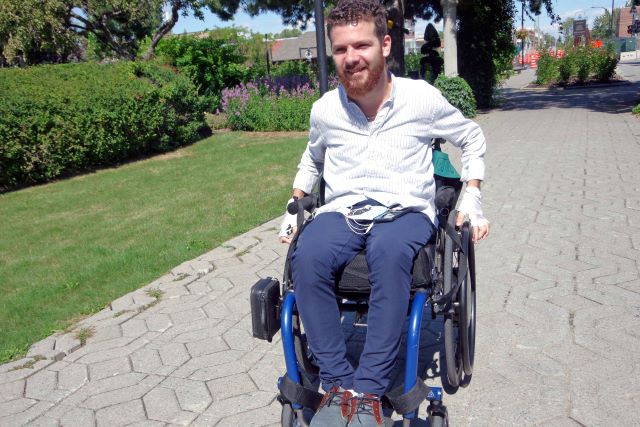Running for office can have special challenges for those with disabilities

By Martin C. Barry
For most people, the idea of putting oneself front and centre and running in an election is enough of a challenge that most never even seriously consider running for office.
Now, try to imagine for a moment what that same experience might be like for a person with a disability – someone who does not have the same access to the electors because of stairs, broken streets and sidewalks or other obstacles that stand in the way.
September 20 marked the second time that Clément Badra ran as a candidate for the Green Party in the federal election in the riding of Mount Royal, after first running in 2019. In spite of his earlier campaigning experience, the second time wasn’t much easier, since a physical disability obliges him to get around in a wheelchair.
Steps can be a problem
“As you can imagine, there are the obvious limitations – the logistics, for example,” he said in an interview with Inspirations. “Going door to door when there are steps can be a problem. Not everything is accessible. So that can be an issue.”
However, there are even greater challenges for disabled candidates, added Badra, involving what only can be described as systemic discrimination, which forces them to work twice as hard to win a nomination to run for a political party.
“When political parties are looking for candidates, the perfect candidate in their mind is not someone who’s blind, it’s not someone who’s in a wheelchair,” he said. “So, you’ve got to be able to show them that you can be a real good candidate. And it can be harder to convince them compared to someone who doesn’t have a disability.
“You have to work twice as hard because of the systemic challenges that someone with a disability has got to face,” he said. “As a result, it’s a lot harder to get involved in politics because politics takes a lot of your time; it takes a lot of energy. So, you’ve got to overcome the challenges that you have in your life every day, and then be willing to go into an election or into the political field. It’s a struggle and can be something that’s very challenging.”
Although 15 to 25 percent of Canadians are affected by some form of disability, Badra pointed out that only one percent of elected officials identify as having a disability. “So, that’s a huge gap in representation between the population and the political representation that we have,” he said, maintaining that the shortfall leads to public policies not reflecting the true needs of the disabled because of their lack of input.
To do his door-to-door campaigning in the residential areas of the riding such as the Town of Mount Royal, Badra developed a system. When there were steps leading to the front door, a volunteer member of his team would go up and ring or knock while he would wait at the bottom.
He said campaigning in condo or apartment buildings is easier as there’s usually an elevator, and he and the volunteers can easily go door to door and floor to floor. The alternative is reaching out to constituents by phone, “but obviously it’s not the same as being able to talk in person with people,” he said. Other alternatives include organizing special open-invitation events, as well as meeting and greeting people on the street, although many of the people encountered may not be eligible voters because they don’t live in the riding.
Improve housing for the disabled
Although Badra finished fifth in the election in a field of seven candidates, he said that if ever he were elected to office, one of his priorities for improving life for the disabled would be to make sure they have access to housing that meets their needs.
“It’s extremely hard to find a place to stay when you’re in a wheelchair,” he said. “I’ve struggled quite a bit with it. I’m lucky enough to have been able to find a place where I can stay. It’s well known that having a roof over your head is a very structural and essential part of staying grounded in your community.”









